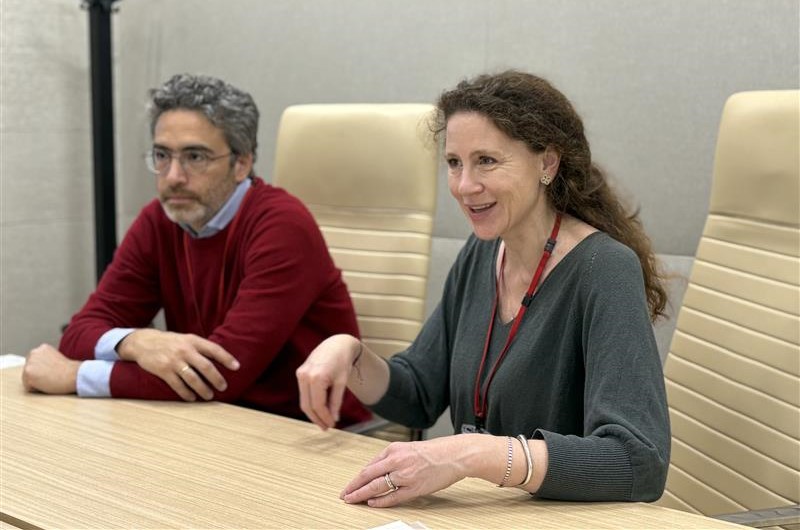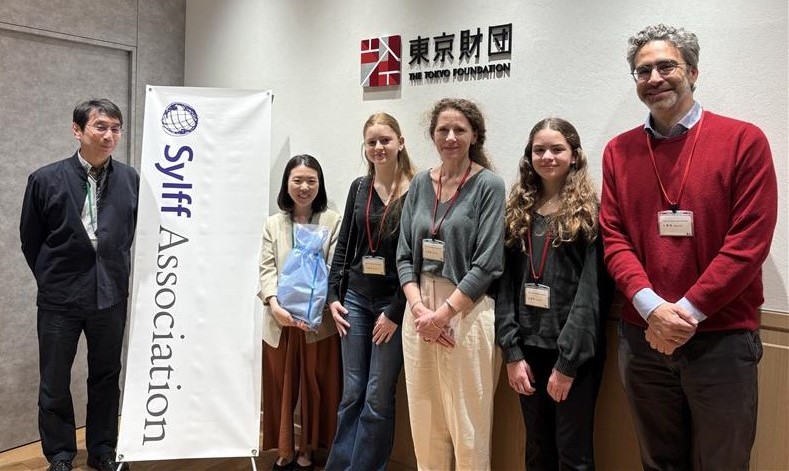Sylff News
May 1, 2025
Sylff@Tokyo: Advocating for a More Holistic Approach to Maternal Care
The Sylff Association secretariat had the pleasure of reconnecting with Michelle Sadler (University of Chile, 2003) during her visit to the Tokyo Foundation on April 15. Currently a professor at Universidad Adolfo Ibáñez in Chile and director of the Chilean Observatory of Obstetric Violence, Sadler blends her academic work with her advocacy in civil society, focusing on maternal and reproductive health and rights.
A participant in Sylff’s Visit Japan Program in 2004, Sadler toured various birth centers across Japan—a transformative experience that “profoundly changed my understanding of childbirth models,” she recalls. “What I witnessed contrasted with my limited exposure to Chilean public maternities and sparked a lifelong passion for maternal health and rights. I remain deeply committed to this cause over twenty years later.”
Today, Sadler resides in Athens, Greece, tutoring PhD students and teaching master-level classes online, as well as conducting research. Having completed a Chilean-government-funded project on HIV last year, she is currently focused on examining issues related to breast cancer. Yet, as she emphasizes, “My chief interest has always been childbirth.”

Michelle Sadler, right, and her husband Panagiotis Gatsos during their visit to the Tokyo Foundation.
A Call for Compassionate Care
Childbirth is a profound experience that is fundamental to human survival and deserving of both reverence and compassion, yet it is often reduced to a clinical procedure. “In many cases, women in labor are forced to lie on their backs, connected to fetal monitors, and aren’t allowed to move freely,” Sadler explains. “Their discomfort and fears are frequently dismissed with comments like, ‘It won’t hurt that much’ or ‘Don’t be a complainer.’ This can be said to be a form of obstetric violence.”
Sadler notes that many women, dissatisfied with their birth experience due to disrespect and mistreatment, have sought alternatives by establishing birth centers that embrace midwifery and wellness models. These centers, she believes, are ideal for those who prefer a natural, low-intervention approach to childbirth, including natural pain management techniques. In contrast, hospitals are more suited to mothers requiring a wider range of medical interventions, such as C-sections or epidurals.

Sadler, center, flanked by daughters Eleni to her left and Sofia, stopped by the Foundation during a family trip to Japan.
“Mothers need to be supported in both their physical care and their bonding with their babies,” Sadler asserts. “Unfortunately, during the pandemic, some were isolated from their kids for days to prevent the spread of COVID-19. Xenophobia, especially in the wake of increased migration from countries like Colombia and Venezuela, has also contributed to mistreatment, particularly of migrant women. These women, who were sometimes unfairly suspected of belonging to drug cartels because of their tattoos, were treated as incapable of caring for their infants. This is a clear violation of human rights.”
Addressing Obstetric Violence in Chile
In addition to her academic and research work, Sadler founded the Chilean Observatory of Obstetric Violence, a small team of professionals—including experts in law, journalism, midwifery, and psychology—who, alongside graduate students, volunteer their time to address issues in maternal health and rights.
“We raise awareness through media columns, public forums, and advocating for legislation that promotes a more holistic approach to maternal care,” Sadler explains. “But our most important work is offering direct support to women who are struggling with the system and need professional assistance.”
The Observatory provides counseling, legal advice, and access to health professionals for women who face barriers to the care they seek, often in hospitals that do not accommodate their needs. “While our funding is limited, we have a strong network,” Sadler says. “Our goal is to ensure that every woman who reaches out to us finds a solution to the challenges she is facing.”
The Sylff Association secretariat is proud of Sadler’s critical work to promote maternal health and rights. Her unwavering dedication to improving maternal care is an inspiring example of the power of combining academic expertise with social engagement.
We are always eager to meet Sylff fellows and other Sylff Association members from around the world. If you are in town, please be sure to let us know, and we would be thrilled to welcome you to our office. (Compiled by Nozomu Kawamoto)